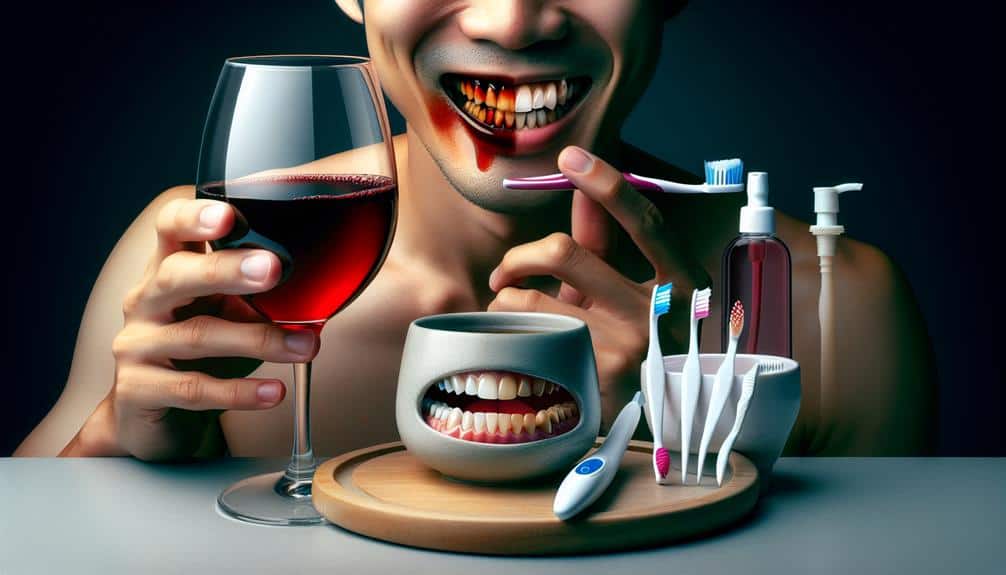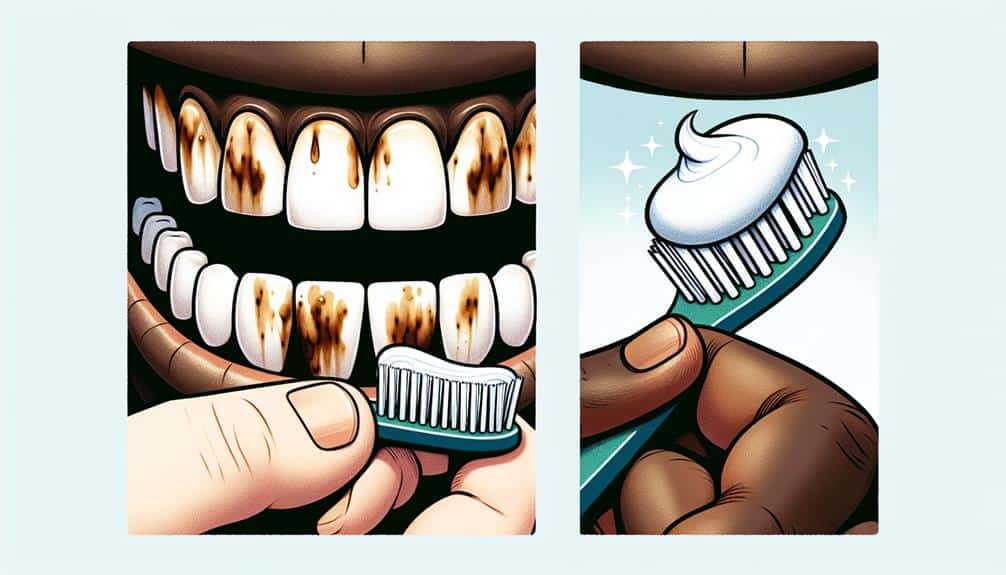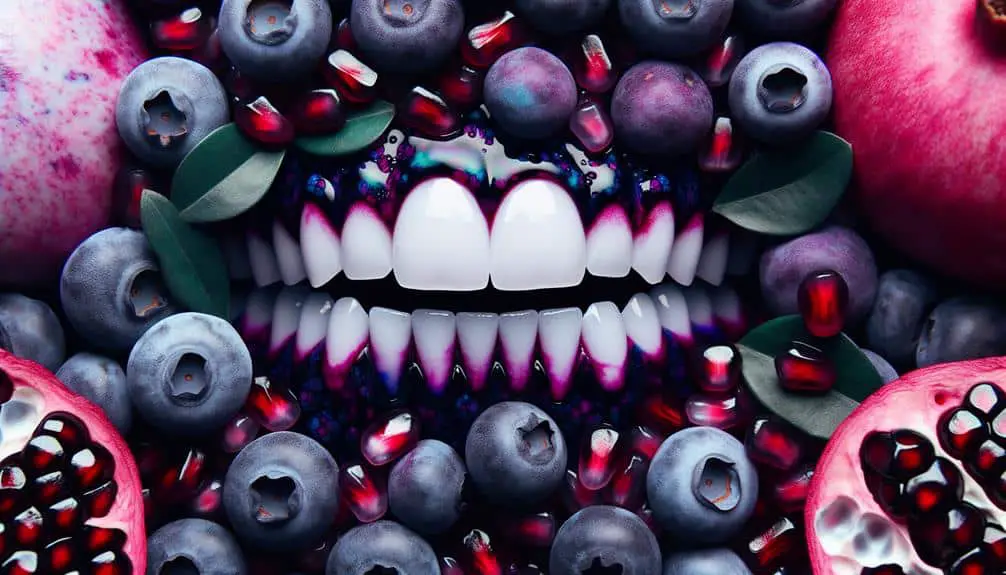To prevent teeth yellowing from balsamic vinegar, limit its consumption and consider alternative vinegars like apple cider or white wine vinegar which are less acidic. Essential dental hygiene is important; remember to brush thoroughly after consuming balsamic vinegar and floss to remove particles that lead to staining. Diluting balsamic vinegar, mixing it with dressings, and rinsing with water can help reduce its impact on your teeth. Quick remedies like brushing with baking soda or oil pulling with coconut oil can combat stains.
For long-term teeth whitening, maintain good oral hygiene, consider professional treatments, and avoid teeth-staining foods. These simple tips can safeguard your smile and dental health effectively.
Key Points
- Dilute balsamic vinegar to reduce acidity and minimize teeth staining.
- Brush teeth after consuming balsamic vinegar to remove residue.
- Rinse with water to wash away vinegar particles and prevent discoloration.
- Use whitening toothpaste or mouthwash to counteract staining effects.
- Incorporate dental check-ups and cleanings to address staining issues promptly.
Understanding Balsamic Vinegars Impact
To understand the impact of balsamic vinegar on teeth yellowing, it's essential to explore its acidic properties and interaction with dental enamel. Balsamic vinegar contains acetic acid, which is known to erode tooth enamel over time, leading to teeth yellowing. An impact analysis reveals that prolonged and frequent exposure to balsamic vinegar can contribute to the staining of teeth. When balsamic vinegar comes into contact with teeth, its acidic nature can weaken the enamel, making it more susceptible to discoloration.
Considering the potential effects on dental health, it's advisable to limit the consumption of balsamic vinegar or consider vinegar alternatives that are less acidic. Some vinegar alternatives, such as apple cider vinegar or white wine vinegar, have lower acidity levels compared to balsamic vinegar. By choosing these alternatives, you can still enjoy the flavor benefits of vinegar while reducing the risk of teeth yellowing. Being mindful of the acidic properties of balsamic vinegar and exploring suitable alternatives can help mitigate its staining effects on teeth.
Tips to Minimize Staining Effects
Minimize the staining effects of balsamic vinegar on your teeth by adopting simple yet effective preventive measures. Proper dental hygiene is essential in reducing the potential for balsamic vinegar to cause discoloration. Brush your teeth thoroughly after consuming balsamic vinegar to remove any residue that could lead to staining. Flossing can also help eliminate particles that may linger between teeth and contribute to discoloration. Additionally, consider using a whitening toothpaste or mouthwash to help counteract any staining effects.
Diet modification is another key strategy to minimize the impact of balsamic vinegar on your teeth. Avoid prolonged exposure by not swishing or holding balsamic vinegar in your mouth for extended periods. Instead, consume it with a meal and rinse your mouth with water afterward. Drinking water during and after consuming foods or drinks that may stain can help wash away pigments before they settle on your teeth. By being mindful of your dental hygiene practices and making small adjustments to your diet, you can enjoy balsamic vinegar without compromising the brightness of your smile.
Best Practices for Consumption
When consuming balsamic vinegar, remember to be mindful of your intake habits and the potential impact on your dental health. To minimize the risk of teeth yellowing, consider diluting the vinegar before use. Vinegar dilution can help reduce its acidity, which is a key factor in causing teeth staining. When incorporating balsamic vinegar into your diet, try mixing it with olive oil or other dressings to lessen its direct contact with your teeth.
Another essential practice is to sip water alongside or after consuming balsamic vinegar. Water helps wash away the vinegar residue from your teeth and mouth, reducing the chances of staining. Swishing water around your mouth can also aid in removing any lingering vinegar particles that might lead to discoloration over time.
Quick Remedies for Stained Teeth
If you're looking to address stained teeth caused by balsamic vinegar, consider trying quick remedies that can help restore your teeth's brightness. Natural remedies can be effective in combating teeth stains. One option is to brush your teeth with baking soda, which has important abrasive properties that can help remove stains caused by balsamic vinegar.
Another remedy is oil pulling with coconut oil. This essential method involves swishing coconut oil around in your mouth to help eliminate bacteria and promote whiter teeth. Additionally, rubbing a small amount of lemon juice mixed with water on your teeth can act as a natural bleaching agent to reduce stains.
In addition to using these natural remedies, it's vital to focus on teeth protection to prevent further staining. Avoid consuming balsamic vinegar in excessive amounts and consider using a straw when drinking acidic beverages to minimize contact with your teeth. Regular dental check-ups and cleanings can also help maintain your oral health and address any staining issues promptly.
Long-Term Teeth Whitening Strategies
To maintain long-term teeth whitening results, incorporating consistent oral hygiene practices and utilizing professional whitening treatments can help achieve a brighter smile. Consistent oral hygiene is key to preventing teeth yellowing and maintaining a white smile.
Brush your teeth at least twice a day with fluoride toothpaste, floss daily to remove plaque between teeth, and rinse with an antiseptic mouthwash to kill bacteria that can cause staining. Additionally, consider professional whitening treatments to enhance and prolong the effects of at-home whitening products. Dentists can offer in-office treatments like bleaching or laser whitening for more dramatic results.
In addition to oral hygiene, your diet choices play a significant role in maintaining white teeth. Avoid foods and drinks that stain teeth, such as coffee, tea, red wine, and dark berries. If you do consume these, rinse your mouth with water afterward.
Incorporate crunchy fruits and vegetables like apples and carrots into your diet, as they can help naturally clean teeth and remove surface stains. By combining good oral hygiene practices with smart dietary choices, you can achieve and maintain long-term teeth whitening results.
Frequently Asked Questions
Can Brushing Your Teeth Immediately After Consuming Balsamic Vinegar Help Prevent Staining?
Brushing your teeth immediately after consuming balsamic vinegar may not prevent staining. Consider using a vinegar rinse or swishing with lemon water. Timing brush after acidic foods and scheduling regular dental checkups can help maintain oral health and prevent discoloration.
Does the Acidity Level of Balsamic Vinegar Affect Its Staining Potential on Teeth?
The acidity level of balsamic vinegar can impact its staining potential on teeth. To minimize this effect, consider your dietary habits and focus on enamel protection. Being mindful of what you consume and maintaining good oral hygiene can help prevent teeth yellowing.
Are There Any Specific Toothpaste Brands or Ingredients That Are More Effective at Removing Balsamic Vinegar Stains?
Toothpaste options vary in stain removal effectiveness. Look for brands with baking soda, hydrogen peroxide, or fluoride. These ingredients can help combat balsamic vinegar stains. Consider toothpaste suggestions from dentists for best oral care.
Can Using a Straw When Drinking Balsamic Vinegar Help Reduce the Risk of Teeth Staining?
Using a straw when drinking balsamic vinegar can be effective in reducing teeth staining. By implementing this simple straw technique into your drinking habits, you can prevent potential discoloration and maintain a brighter smile.
Is There a Recommended Frequency for Consuming Balsamic Vinegar to Minimize Its Impact on Teeth Yellowing?
To minimize teeth yellowing from vinegar consumption and reduce enamel erosion, it's advisable to limit daily intake. Moderation is key in preventing teeth discoloration. Consider consulting with a dental professional for personalized recommendations on vinegar consumption frequency.




